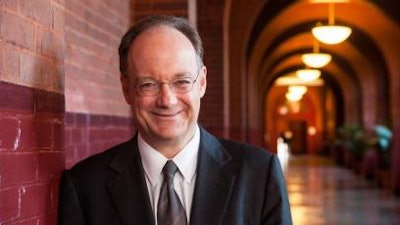 Dr. John G. DeGioia, president of Georgetown University
Dr. John G. DeGioia, president of Georgetown UniversityThe nation’s oldest Catholic university has initiated a wide range of sweeping reforms in an effort to address racial inequities both on and off campus.
Dr. John J. DeGioia, president of Georgetown University, has called for the creation of an African American studies department and major as well as three new bold initiatives that will include a center for researching racial injustice, a recruitment effort to hire more faculty of color, and the recruitment of a new senior officer to oversee these ambitious initiatives.
“This is the moment to find within each of ourselves, and within our community, the sources of our moral imaginations to determine how we can contribute to responding to this urgent moment in our nation,” DeGioia told dozens of students, faculty and staff who gathered on campus late last week for a planned speech.
Like many predominantly White colleges and universities across the country, Georgetown has long been criticized for its lack of diversity, particularly among its faculty.
And though the university now has a handful of prominent African-American faculty like Dr. Michael Eric Dyson, it wasn’t until the early 1980s that the university’s main campus tenured its first Black faculty member.
DeGioia, who is a seasoned administrator and alumnus of the Jesuit university founded in 1789, has made diversity a central part of his presidential legacy over the last few years. The first lay person to lead the historic institution, he has sanctioned a number of dramatic changes aimed at making the university located in the tony Washington, D.C. neighborhood of Georgetown much more inclusive for students of color.
Last month, DeGioia accepted the recommendation of a campus-established committee called the Working Group on Slavery, Memory, and Reconciliation and agreed to strip the names of two past presidents—Fr. Thomas Mulledy and Fr. William McSherry—from university halls. Both Mulledy and McSherry were responsible for the sale of about 272 slaves during the 1800s. The buildings were renamed Freedom Hall and Remembrance Hall.
In the fall, Georgetown will implement a two-course diversity requirement for all incoming undergraduate students. The Black House, which was founded in 1973 as an off-campus residence for Black students, was relocated to a new and larger residence in 2013.
“As a university, Georgetown acknowledges its constituents—its students, faculty, staff, alumni, and those who have ultimate fiduciary responsibility—our Board of Directors,” said DeGioia. “We are also a Catholic and Jesuit institution and we adhere to that identity intrinsic to us from our founding. We have pursued, given these varied constituencies, organic growth, participating, and change, emphasizing alignment among our multiple parts.”
Though DeGioia has expressed his support for an African American studies department and major, the university faculty would still have to approve such a measure. Last year, Princeton University established an African American studies major and is now offering undergraduate degrees in the discipline.
The idea that Georgetown will likely follow suit is welcomed news for Dr. Robert J. Patterson, who is director of the African American studies program, which currently offers a minor.
“With Georgetown University’s increasing emphasis on interdisciplinarity, the establishment of an African American Studies major, in conjunction with other initiatives, positions African American Studies in a unique and important role to produce and distribute knowledge as well as to stake an important place in the University’s future, as the University furthers its Jesuit mission and commitment to social justice,” said Patterson, who is also an alumnus. “The major also will allow students the opportunity to examine, understand, and apply the epistemological, cultural, historical, artistic, and political contributions that African Americans, as well as Africans throughout the diaspora, have made to the world, while preparing them to be culturally literate in a world that is increasingly globalizing and desiring of more robust ways of thinking and broader perspectives.”
Jamal Eric Watson can be reached at [email protected]. You can follow him on twitter @jamalericwatson





















